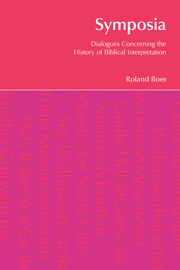Book contents
- Frontmatter
- Dedication
- Contents
- Preface
- Abbreviations
- 1 Caught in the Prolegomena: Julius Wellhausen and Source Criticism
- 2 In the Beginning: Hermann Gunkel and Form Criticism
- 3 In the Underground: Martin Noth and Redaction Criticism
- 4 The Longest Revolution: Phyllis Trible and Feminist Criticism
- 5 A Spectre Is Haunting Biblical Studies: Norman Gottwald and the Social Sciences
- 6 On the Beach: The Bible and Culture Collective and the Postmodern Bible
- Select Bibliography
- Subject Index
Preface
- Frontmatter
- Dedication
- Contents
- Preface
- Abbreviations
- 1 Caught in the Prolegomena: Julius Wellhausen and Source Criticism
- 2 In the Beginning: Hermann Gunkel and Form Criticism
- 3 In the Underground: Martin Noth and Redaction Criticism
- 4 The Longest Revolution: Phyllis Trible and Feminist Criticism
- 5 A Spectre Is Haunting Biblical Studies: Norman Gottwald and the Social Sciences
- 6 On the Beach: The Bible and Culture Collective and the Postmodern Bible
- Select Bibliography
- Subject Index
Summary
I must confess to having read Plato's Symposium only recently. Since I was writing a similarly titled book, indeed a book with a similar structure, I thought I had better read the original, even if it was some 2,400 years after it was written. Reading Plato is a bit like reading the Bible or indeed Marx: some bits we know very well, having absorbed them in ways in which we are barely conscious, and other bits we are surprised to find there at all. Many of the readers of this book might be able to tick some of the following: the myth of the cave; the theory of forms or ideas; the banishment of playwrights from his ideal republic; the philosopher king; Platonic relationships, to name but a few.
But then I may be assuming too much, since reading the Symposium took me back to my first degree in Classics: small classes, often just a couple of us, at the University of Newcastle (the Australian version) set in the delta of the coal-bound Hunter Valley. With all my teenage friends heading off to take up apprenticeships in the mines, or, if they finished high school, foreman's positions at the same mines where they still earn way more than I ever will, no one could make sense of Classics.
- Type
- Chapter
- Information
- SymposiaDialogues Concerning the History of Biblical Interpretation, pp. ix - xiiPublisher: Acumen PublishingPrint publication year: 2007



